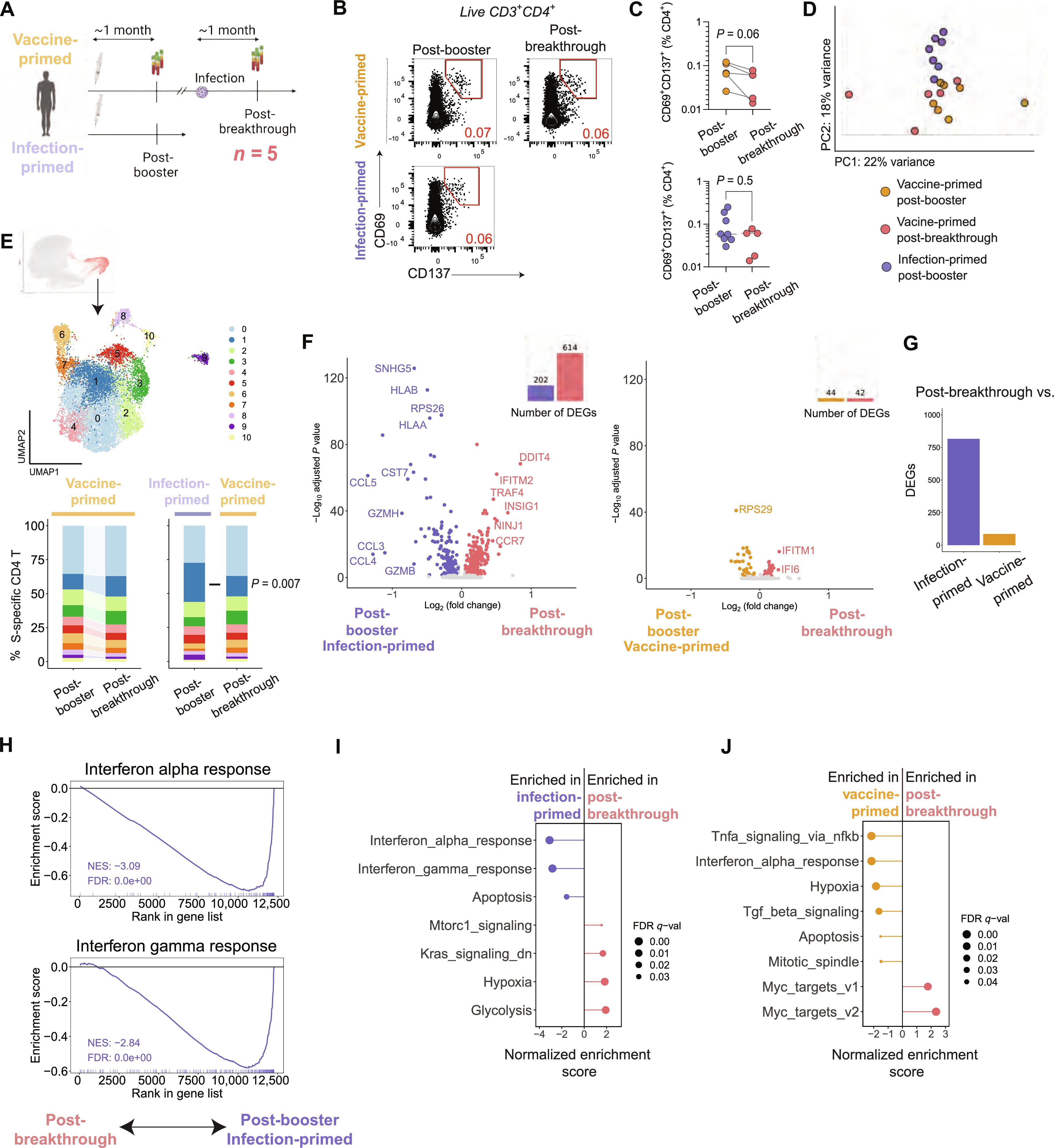SARS-CoV-2 inflammation durably imprints memory CD4 T cells
IF 17.6
1区 医学
Q1 IMMUNOLOGY
引用次数: 0
Abstract
Memory CD4 T cells are critical to human immunity, yet it is unclear whether viral inflammation during memory formation has long-term consequences. Here, we compared transcriptional and epigenetic landscapes of Spike (S)–specific memory CD4 T cells in 24 individuals whose first exposure to S was via SARS-CoV-2 infection or mRNA vaccination. Nearly 2 years after memory formation, S-specific CD4 T cells established by infection remained enriched for transcripts related to cytotoxicity and for interferon-stimulated genes, likely because of a chromatin accessibility landscape altered by inflammation. Moreover, S-specific CD4 T cells primed by infection had reduced proliferative capacity in vitro relative to vaccine-primed cells. Furthermore, the transcriptional state of S-specific memory CD4 T cells was minimally altered by booster immunization and/or breakthrough infection. Thus, infection-associated inflammation durably imprints CD4 T cell memory, which affects the function of these cells and may have consequences for long-term immunity.

SARS-CoV-2炎症会持久印记记忆CD4 T细胞。
记忆性 CD4 T 细胞对人体免疫至关重要,但目前还不清楚记忆形成过程中的病毒炎症是否会产生长期影响。在这里,我们比较了 24 个首次接触 SARS-CoV-2 感染或接种 mRNA 疫苗的人体内 Spike(S)特异性记忆 CD4 T 细胞的转录和表观遗传景观。记忆形成近两年后,通过感染建立的 S 特异性 CD4 T 细胞仍然富集与细胞毒性相关的转录本和干扰素刺激基因,这可能是因为染色质可及性景观因炎症而发生了改变。此外,与疫苗诱导的细胞相比,感染诱导的 S 特异性 CD4 T 细胞在体外的增殖能力降低。此外,S特异性记忆CD4 T细胞的转录状态受加强免疫和/或突破性感染的影响很小。因此,与感染相关的炎症会持久地印记 CD4 T 细胞记忆,从而影响这些细胞的功能,并可能对长期免疫产生影响。
本文章由计算机程序翻译,如有差异,请以英文原文为准。
求助全文
约1分钟内获得全文
求助全文
来源期刊

Science Immunology
Immunology and Microbiology-Immunology
CiteScore
32.90
自引率
2.00%
发文量
183
期刊介绍:
Science Immunology is a peer-reviewed journal that publishes original research articles in the field of immunology. The journal encourages the submission of research findings from all areas of immunology, including studies on innate and adaptive immunity, immune cell development and differentiation, immunogenomics, systems immunology, structural immunology, antigen presentation, immunometabolism, and mucosal immunology. Additionally, the journal covers research on immune contributions to health and disease, such as host defense, inflammation, cancer immunology, autoimmunity, allergy, transplantation, and immunodeficiency. Science Immunology maintains the same high-quality standard as other journals in the Science family and aims to facilitate understanding of the immune system by showcasing innovative advances in immunology research from all organisms and model systems, including humans.
 求助内容:
求助内容: 应助结果提醒方式:
应助结果提醒方式:


